“I don’t find these dolls very pretty, they’re scary and I don’t want to look at them”
Black dolls, often relegated to second place on store shelves in Port-au-Prince, are struggling to win the hearts of customers.
“I have nothing against black dolls, but I don’t buy them for my child,” a lady expresses with particular frankness as she carefully observes the assortment of toys on the shelves of Delimart in Delmas 32 on Saturday, November 11, 2023, around 2 p.m.
“I don’t find these dolls very pretty, they’re scary and I don’t want to look at them,” continues the lady in search of a miniature baby doll for her child.
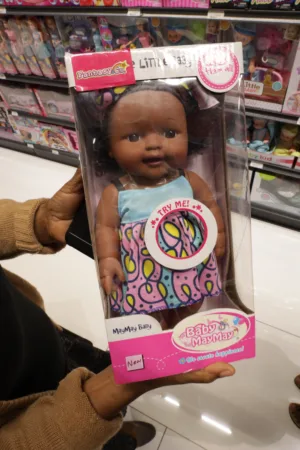
Photo of a black doll on sale at Delimart (Delmas 32). November 11, 2023. | © Jean Feguens Regala/AyiboPost
AyiboPost visited nearly fifteen points of sale in the metropolitan area of Port-au-Prince. Everywhere, the observation remains striking: black dolls are significantly less present than those of lighter complexions.
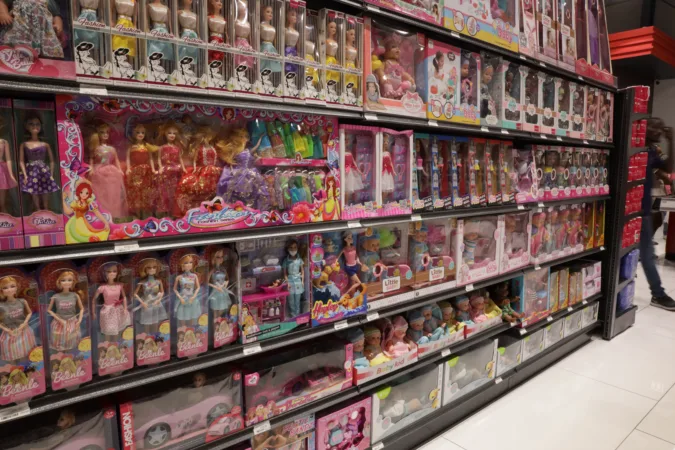
The doll department at Delimart in Delmas 32.| © Jean Feguens Regala/AyiboPost
Only two to three black dolls are present among about ten so-called “white” dolls in the Mikado installations in Belmart.
According to Dominique Raynold, the toy department management of said store, black dolls do not sell at all.
“We have had these dolls on our shelves for almost a year, Raynold told AyiboPost. When a parent is offered to buy them, they are always reluctant to choose them.”

The toy department at MIKADO, November 11, 2023. | © Jean Feguens Regala/AyiboPost
The observation is similar at Olympic Market in Lalue. Most black dolls are three years old and “customers, often children, really don’t like them,” analyzes Stéphanie Mondésir, sales manager in the toy department.
According to the seller, the few black dolls sold are not intended for children, but rather for superstitious practices. “Even school leaders prefer to buy “white” dolls to illustrate baptisms and weddings, rather than black dolls. »
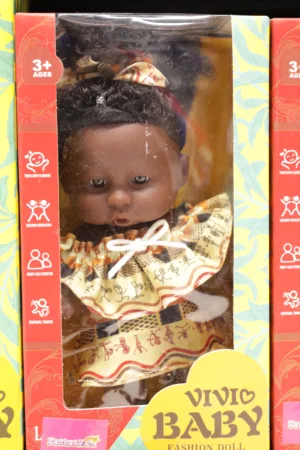
Photo of a black doll at Delimart Delmas 32. November 11, 2023. | © Jean Feguens Regala/AyiboPost
Several hypotheses were put forward to explain the aversion to black dolls in Haiti.
Fania Noël, author and doctoral student in sociology, thinks she sees “colorism” at work. This means that the closer a color is to “white”, the more desirable it is.
According to the feminist, this prejudice, particularly present in black communities, notably in Haiti, the Caribbean and in African countries, remains one of the consequences of slavery.
In practice, colorism causes the phenomena of depigmentation or of hair straightening in women, underscores Noël. “It’s a form of misogynoir that is both sexist and racist,” according to the author of the Afro-communitarian book, ‘Belonging to Ourselves’.”
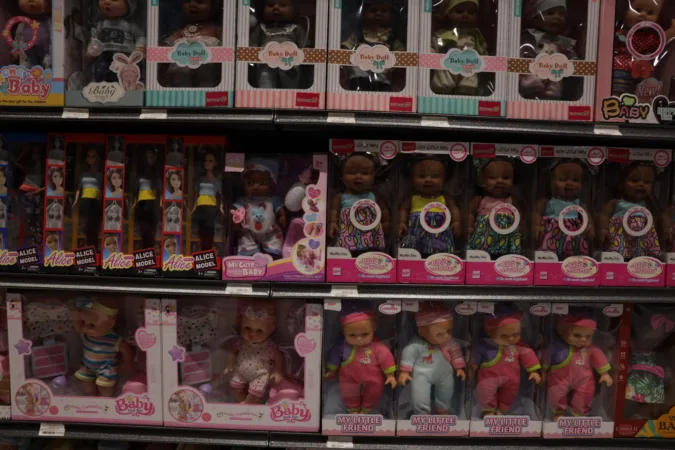
Doll section, with some black dolls. | © Jean Feguens Regala/AyiboPost
Some parents like Jésula Exumé, a 40-year-old shopkeeper living in Carrefour, associate dolls with evil spirits.
The mother of three remembers once buying a doll for her first daughter: the toy was “white in complexion.” “My daughter is fair and I don’t think black dolls are pretty, I don’t like them,” says Exumé.
The situation is similar for Natacha Charles, a lady in her thirties, living in Delmas. Reluctant to buy dolls, she gives in at the insistence of her two daughters.
“Personally, I don’t like black things,” says Charles, noting that her children also share this preference. “My children prefer beige or cream-colored dolls, with pink mouths, rather than a black doll.”

Photograph of a black doll. November 11, 2023. | © Jean Feguens Regala/AyiboPost
This phenomenon is not unique to Haiti. In the 1940s, psychologists Kenneth and Mamie Phipps Clark orchestrated a series of experiments known as the « doll tests » to examine the psychological impacts of racism on African-American children.
As part of this study, it was found that most black children showed a preference for so-called “white” dolls, attributing positive traits to them, while they associated negative characteristics to black dolls.
Additionally, when asked to describe the doll that best matched their own image, some children experienced “emotional distress” when identifying with the previously rejected doll.
At the time, the study shed light on the phenomenon of racism and internalized prejudice, highlighting the harmful consequences of school segregation on African-American children. The results showed that children in this community were aware that the color of their skin was associated with a perception of inferiority.
According to Irvika François, doctor of educational sciences and educator for almost 25 years, a doll constitutes a symbolic representation of the child, acting as a medium facilitating the transmission of family, cultural and social values.
“The doll plays an essential role in the learning of social norms and the development of empathy in children, thus conveying various fundamental values,” continues Dr François.
Very little research exists on these issues in the country. “The issue of the representation of the black doll in Haiti deserves to be explored to better understand our relationship to our identity. As long as this is not resolved, the black doll will never have the chance to be recognized as something beautiful” believes Dr. Irvika François.
Black dolls remain relatively rare and difficult to find throughout the country, outside of Port-au-Prince.
“When we request black dolls from suppliers, they suggest that they are used in peristyles,” defends Barbara, a cashier met at BigStar Market in Pétion-Ville.

Doll section with some black dolls. | © Jean Feguens Regala/AyiboPost
In November 2021, a teacher introduced the “Bititi” initiative (Fanm vanyan in Swahili), a collection of black dolls, to Haiti.
The toys embodied various national heroines such as Sanite Belair, Marie-Jeanne, Catherine Flon, Marie-Louise Coidavid and Anacaona.

Marie Jeanne and Catherine Flon. | © Bititi
“I conceived this idea to guarantee children access to a doll reflecting their identity and encourage the celebration of their history,” Valérie Lamy, educator and director of Frimousse Kindergarten, told AyiboPost.
After a relatively successful debut, Bititi dolls are now practically unavailable in stores, but can be ordered online, says Lamy.
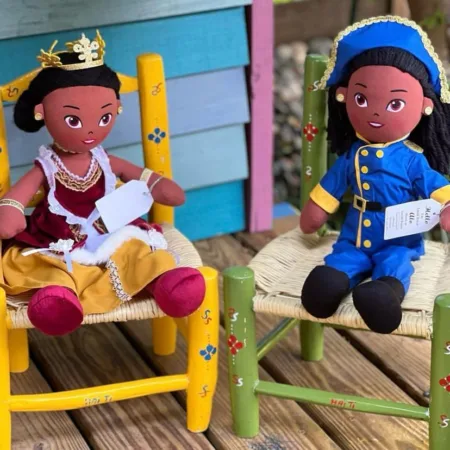
Sanite Belair and Marie Louise Coadavid.| © Bititi
According to specialists, the issue of toys must be the subject of serious discussion in the country.
“Due to our patriarchal society, the association of dolls with girls raises gendered educational questions, influencing young girls’ perceptions of beauty, feminine roles and standards of desirability,” declares Fania Noël.
Solving the problem requires public policies and frank societal debate. “Telling children to play with dolls that look like themselves is not enough,” according to Noël.
The issue, according to the sociologist, is « to have children who play with lots of dolls that may or may not look like them, without the intrinsic value of an individual’s beauty or physical appearance becoming synonymous with his or her moral status and social worth.”
[metaslider id=54345]
© Image de couverture : Photo of the doll department at Delimart with black dolls| © Jean Feguens Regala/AyiboPost
Stay in touch with AyiboPost through :
► Our WhatsApp channel : click here
► Our WhatsApp Community : click here
► Our Telegram canal : click here







Comments